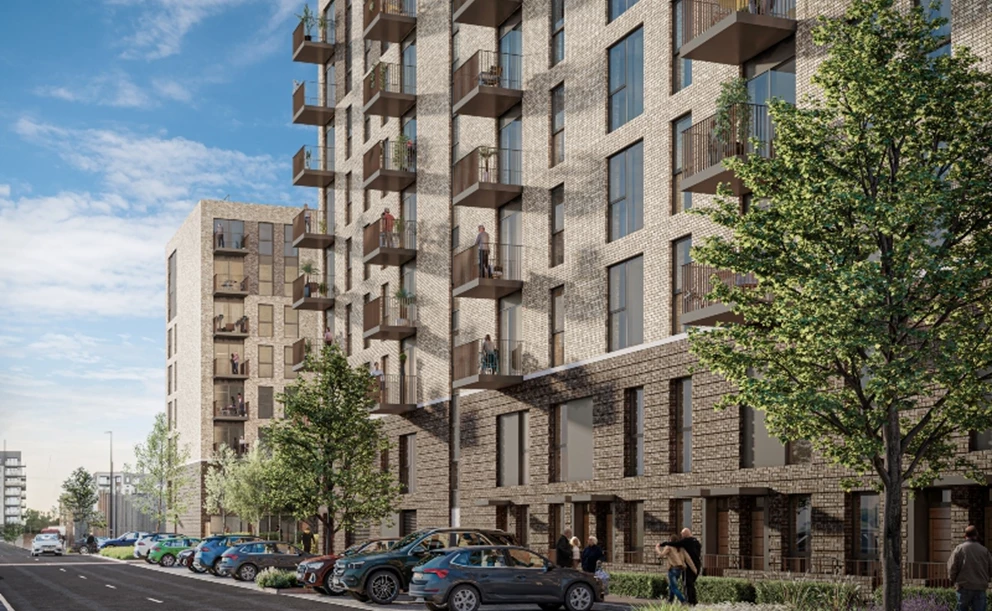Tackling the housing and climate challenges: Legal & General Affordable Homes’ social impact revealed
The Good Economy, a leading independent impact advisory firm, has produced its second performance report on Legal & General Affordable Homes (LGAH), a follow up on its first review published in 2022.
18 Oct 2023

The independent assessment found that LGAH is making strong progress against its twin aims of increasing the supply of affordable, sustainable housing and raising the service standards within the sector.
Over the year, LGAH increased its total number of homes by 80%, taking the total number to 3,032, with more than 2,700 homes in the pipeline.
Rents for the occupied homes are on average significantly below local market rates and over two thirds are at or below the Local Housing Allowance.
LGAH has committed c.£1bn to building new housing and has ambitious plans to deliver 3,000 homes per year in the medium-term across the UK. The business aims to become the leading institutional affordable housing provider in the UK and to make a positive impact on the lives of people who rely on the affordable housing sector.
The report looked at LGAH’s journey towards becoming a net zero housing provider – with a target of all new homes being net-zero carbon enabled by 2030. It found that 97% of completed homes have a high EPC rating of A or B.
Looking to the future, the report praised LGAH’s updated Sustainability Framework that goes above and beyond legal requirements and will support the organisation to accurately measure its performance over time.
Central to LGAH’s ethos is providing best-in-class customer service, and the report demonstrated that this has been well received by residents.
A review of post-occupancy data showed that LGAH’s Net Promoter Score (NPS) of 59 is four points higher than last year’s score, with a NPS over 50 considered ‘high’.
The publication of the report follows the unveiling of LGAH’s strengthened Board - with new a chair and two new independent non-executive directors joining the already experienced team.
The strength of LGAH’s governance is highlighted in The Good Economy’s findings and reinforced by LGAH becoming the first for-profit Registered Provider to achieve the highest Governance and Viability grading from the Regulator of Social Housing.
This latest iteration of the impact report measures LGAH’s performance against a bespoke framework, developed in collaboration with The Good Economy, for improving its impact on people and the planet. The framework also puts targets and mechanisms in place to ensure its commitments are met. This process will continue to be repeated and reported on an annual basis.
Ben Denton, Chief Executive, Legal & General Affordable Homes: "LGAH is an ambitious business and this report shows that we’re making strong progress in many areas, but this is only the beginning for us.Our ongoing collaboration with The Good Economy ensures we hold ourselves accountable to delivering positive social and environmental change. This isn’t about sentiment, but real impact.
Through the introduction of new technologies, closer partnerships and a strengthened governance, we will continue to make good on our promises to provide high-quality, affordable housing and develop sustainable communities, now and into the future.”
Sarah Forster, co-founder and CEO, The Good Economy: “Just two years ago we worked with LGAH to develop an impact framework that set out how its capital could be used to help solve the nation’s affordable housing crisis. This framework outlined an ambitious goal to provide high-quality, sustainable, and well-managed affordable homes in areas of need, while strategically contributing to raising standards in and capital for the social housing sector.Our latest independent impact assessment drew on a wide range of data sources to assess positive impact achieved as well as areas for improvement. This included affordability analysis of LGAH rents and service charges, local housing needs analysis, site visits, stakeholder interviews, survey data analysis and document reviews.
Our findings illustrated that despite facing challenging economic conditions in the last year, LGAH made significant progress towards achieving its ambitions. They acquired 1,347 homes in areas of high housing need, positively impacting the lives of many individuals. Furthermore, LGAH is actively expanding its influence and presence within the sector, and we eagerly anticipate its continued growth as it endeavours to maximise its positive impact for people, places and the planet.”
Further information

Samantha Southwell
Digital Communications Lead
Legal & General Affordable Homes
T: 07531222828
Notes to editors
Established in 1836, Legal & General is one of the UK's leading financial services groups and a major global investor, with £1.2 trillion in total assets under management1 of which 40% is international. We have a unique and highly synergistic business model, which continues to drive strong returns. Legal & General provides powerful asset origination and management capabilities directly to clients, which also underpin our leading retirement and protection solutions. We are a leading international player in Pension Risk Transfer, in UK and US life insurance, and in UK workplace pensions and retirement income. Our purpose is to improve the lives of our customers and create value for our shareholders. Through inclusive capitalism, we are investing in long-term assets, such as real estate and infrastructure, that can help build a better society for the future.
1Data as at 31 December 2023.
Legal & General Capital (LGC) is Legal & General Group’s alternative asset platform, creating assets for Legal & General Retirement and third-party clients in order to achieve improved risk-adjusted returns for our shareholders. LGC has built its capabilities in a range of alternative sectors, including in residential property; specialist commercial real estate; clean energy; alternative credit; and venture capital, which are all supported by long-term structural growth drivers, meet a financing gap, and respond to a scarcity of supply that is underpinned by enduring societal needs.
